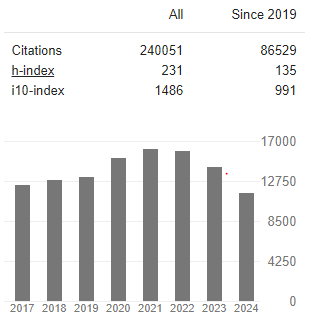Frequency of Brain Metastasis in Breast Cancer Patients and Factors Leading to it
Abstract
Naila Zahid, Lubna Saleem, Annam Zahid, Syed Hassan Khalid, Shaheena Akbani
Objective: Breast cancer is the second commonest cause of brain metastasis after lung cancer.10-16% of patients diagnosed with breast cancer ultimately develop brain metastasis. As most of chemotherapeutic drugs do not cross blood brain barrier despite adequate management of breast cancer risk of CNS relapse persist. Prognosis for breast cancer patients after developing brain metastases is poor. Therefore, we sought to determine the frequency of brain metastasis in Pakistani breast cancer survivors, how often brain metastasis is the first site of recurrence and what are the risk factors that indicate greater likelihood of this event occurrence so that more accurate screening for patients at risk can be established.
Methods: We retrospectively reviewed medical record of 507 patients with invasive breast cancer of all stages who received treatment in Liaquat National Hospital from January 2010 to December 2015. Patients who developed brain metastasis were identified and stratified according to risk factors.
Result: Out of 507 patients 51(10%) developed brain metastasis. 14 patients had brain metastasis as first site of recurrence. On univariate analysis negative hormone receptor status, triple negative and her2 enriched subtype, higher tumor size, lymph node positivity, stages 3 and 4, lymphovascular and peri nodal extension, shorter diseasefree survival and recurrence with visceral metastasis had a statistically highly significant impact on brain metastasis occurrence, while young age at diagnosis (≤35 years), menopausal status, BMI and tumor histology showed no statistically significant impact.
Conclusion: Brain metastases are more frequent in triple negative, Her2Neu positive and Estrogen and Progesterone receptor negative patients. Other factors associated with higher risk of brain metastases in breast cancer patients include larger tumor size, positive axillary lymph nodes, higher stage and lymphovascular and periodontal invasion. Frequency of brain metastasis in breast cancer patients and factors leading to it.



